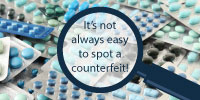If you take or use counterfeit medicines or medical devices you are risking your health.
The products have not been checked by us and it is impossible to know for certain what you are using.
What are counterfeit medicines and devices?
Counterfeit medicines or medical devices are imitation goods which are packaged to look like genuine items. Products are considered counterfeit (fake) if they are falsely manufactured, packaged or advertised.
Risks
Using counterfeit medicines or medical devices carries a high risk of unexpected or potentially serious reactions.
Counterfeit medicines and medical devices are often deliberately packaged to look like the genuine article. However, our investigations have found these products may contain:
- the wrong active ingredient
- no active ingredient
- too much or too little active ingredient and variations across tablets and batches
- substances withdrawn from sale for safety reasons
- toxic or dangerous substances
- substandard components.
While people buy counterfeit products because they are cheaper, they have wasted money on products that may not work or may be harmful.
If you have a serious medical condition, seek professional medical advice.
What products are counterfeited?
All types of medicines and medical devices are targets for counterfeiting, including:
- weight loss, hair loss and erectile dysfunction medicines
- falsely labelled herbal and complementary medicines
- over-the-counter products like paracetamol and ibuprofen
- life-saving medicines such as AIDS, cancer and heart medicines.
Medical devices, including condoms, blood glucose test strips, contact lenses and even surgical devices are also subject to counterfeiting.
Case Study - Sibutramine in illegal weight loss medicines
 Many illegal weight loss medicines we've detected have contained ingredients that are unsafe and are not printed on the label.
Many illegal weight loss medicines we've detected have contained ingredients that are unsafe and are not printed on the label.
The most commonly detected undisclosed ingredient is sibutramine - a former prescription medicine withdrawn from Australia in 2010 due to increased risk of heart attack and stroke.
See our safety alerts for details of these medicines and other counterfeit and illegal medicines that have been detected.
Our role
Import, manufacture and supply of counterfeit therapeutic goods is against the law and subject to criminal and civil penalty provisions in the Therapeutic Goods Act 1989.
Counterfeit medicines or medical devices are a serious threat to public health. We cooperate with State and Territory governments to closely monitor the supply chain in Australia to prevent counterfeit medicines and medical devices from entering the marketplace. Because of the safety risks posed, counterfeit medicines are normally seized and destroyed when imported.
Convicted offenders can face prison terms of up to seven years or heavy fines. Large fines may apply to those found in breach of the civil penalty provisions.
Report suspected counterfeit medicine or devices
If you are concerned about counterfeit medicines or medical devices, or suspect you may have seen or bought counterfeit goods, you can make a report to us:
- online: Report a perceived breach of the Therapeutic Goods Act or questionable practices relating to therapeutic products
- by phone: 1800 020 653
- by email: info@tga.gov.au
- in writing, via post to:
- Compliance and Monitoring Section
Regulatory Compliance Branch
Therapeutic Goods Administration
PO Box 100
Woden ACT 2606
- Compliance and Monitoring Section

